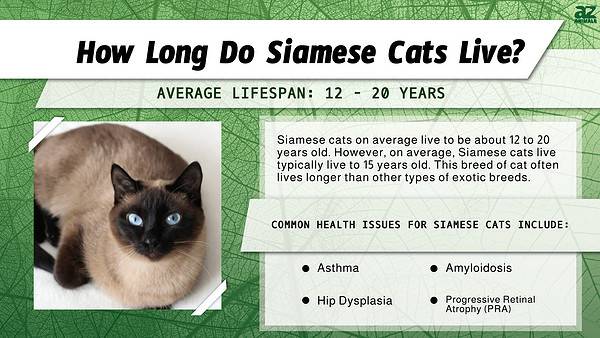The enchanting Siamese cat, with its striking sapphire-blue eyes and sleek, color-pointed coat, has captivated cat lovers for centuries. Beyond their mesmerizing appearance and vocal personalities, a common question arises among prospective and current owners: "What is the average lifespan of a Siamese cat?" This seemingly simple query opens the door to a fascinating exploration of feline genetics, health management, and the unique factors that contribute to a long and healthy life for these elegant creatures. Understanding the Siamese cat lifespan is crucial for providing the best possible care, ensuring many years of companionship and joy.
The Average Lifespan: A Promising Outlook
The average lifespan of a Siamese cat is a topic of significant interest. While the general house cat typically lives between 12 and 15 years, the Siamese cat lifespan often exceeds this average. A healthy Siamese cat can live for 15 to 20 years, with many individuals living even longer. It's not uncommon to hear of Siamese cats reaching 22 or even 25 years of age. This impressive longevity is a testament to their robust genetics and a key reason why they are such a sought-after breed. The longer lifespan of Siamese cats is a major draw for owners who are looking for a long-term companion. This extended Siamese cat lifespan gives owners more time to bond with their pets and enjoy their unique personalities.
Factors Influencing the Siamese Cat Lifespan
Several critical factors influence the longevity of a Siamese cat. While their genetics provide a strong foundation, the environment, diet, and healthcare they receive play an equally important role in determining their lifespan.
1. Genetic Predisposition and Hereditary Health
The Siamese cat's genetic makeup is a primary determinant of its health and longevity. However, like many purebred cats, they are prone to certain hereditary conditions. Awareness of these potential issues is key to proactive healthcare and can significantly impact the Siamese cat lifespan.
- Amyloidosis: This is a serious condition where an abnormal protein (amyloid) is deposited in various organs, most commonly the liver and kidneys. This can lead to organ failure and is a known risk for the Siamese cat. Early detection and management are vital.
- Progressive Retinal Atrophy (PRA): PRA is a degenerative eye disease that can lead to blindness. While it doesn't directly impact the cat's lifespan, it can affect their quality of life. Responsible breeding practices aim to screen for and eliminate this genetic trait.
- Asthma and Bronchial Disease: Siamese cats have a higher prevalence of feline asthma than other breeds. This respiratory condition requires careful management, including medication and environmental control, to ensure the cat's comfort and health.
- Congenital Heart Defects: While less common, some Siamese cats may be born with heart conditions like hypertrophic cardiomyopathy (HCM). Regular veterinary check-ups can help detect these issues early.
Understanding these genetic predispositions is crucial for any Siamese cat owner. Reputable breeders will provide health clearances for their breeding cats, which is a major factor in ensuring a longer Siamese cat lifespan.
2. The Power of Proper Nutrition
A high-quality diet is fundamental to maximizing a Siamese cat's lifespan. Nutrition directly impacts their overall health, energy levels, and ability to fight off disease.
- High-Quality Protein: Cats are obligate carnivores, and their diet should be rich in animal-based protein. Look for cat food with a named meat source (e.g., chicken, fish, beef) as the first ingredient.
- Taurine: This essential amino acid is vital for heart and eye health. A deficiency can lead to serious health problems and shorten the Siamese cat lifespan. Quality commercial cat food is fortified with taurine.
- Weight Management: Obesity is a significant health risk for any cat and can drastically reduce their lifespan. An overweight Siamese cat is more susceptible to diabetes, joint problems, and heart disease. Monitoring their food intake and providing a balanced diet is critical. The long Siamese cat lifespan is often attributed to owners who are diligent about their cat's weight.
3. The Importance of Veterinary Care
Regular veterinary check-ups are non-negotiable for a long and healthy Siamese cat lifespan. Preventative care is far more effective and less costly than treating a serious illness.
- Annual Check-ups: These visits allow the vet to perform a physical exam, check for any abnormalities, and administer necessary vaccinations. They also provide an opportunity to discuss any changes in the cat's behavior or health.
- Dental Health: Dental disease is a common problem in cats and can lead to serious infections that affect the heart, kidneys, and liver. Regular dental cleanings and at-home dental care are crucial for prolonging the Siamese cat's lifespan.
- Vaccinations: Keeping up with the recommended vaccination schedule protects the cat from common and potentially fatal diseases.
- Parasite Prevention: Fleas, ticks, and worms can cause a variety of health problems. Regular use of preventative medication is essential.
4. The Role of Environment and Lifestyle
The environment in which a Siamese cat lives also plays a significant role in their lifespan.
- Indoor vs. Outdoor: Indoor cats generally live much longer than outdoor cats. Outdoor cats face numerous risks, including traffic, predators, infectious diseases, and fights with other animals. Keeping your Siamese cat indoors is one of the most effective ways to ensure a longer Siamese cat lifespan.
- Mental and Physical Stimulation: Siamese cats are highly intelligent and energetic. They require mental and physical stimulation to prevent boredom and stress, which can lead to behavioral and health issues. Providing toys, scratching posts, and interactive play sessions is vital. A stimulated and happy cat is a healthy cat, and this contributes to a longer Siamese cat lifespan.
- Stress Reduction: A calm and stable environment is important. Siamese cats are sensitive to stress, which can weaken their immune system. A consistent routine, a quiet space, and a lack of sudden changes can help manage their stress levels.
5. Early Spaying or Neutering
Spaying or neutering your Siamese cat is a critical decision that can have a profound impact on their lifespan.
- Reduced Risk of Cancer: Spaying a female cat eliminates the risk of ovarian and uterine cancers and significantly reduces the risk of mammary tumors. Neutering a male cat eliminates the risk of testicular cancer and reduces the risk of prostate problems.
- Behavioral Benefits: Spaying and neutering can also reduce the cat's instinct to roam, which is especially beneficial for indoor cats, as it prevents them from trying to escape and reduces the risk of injury. This single choice can significantly extend the average lifespan of a Siamese cat.
Understanding the Siamese Cat Lifespan in Detail
When discussing the average Siamese cat lifespan, it's important to look at the data and anecdotes. While 15-20 years is the generally accepted range, many owners report their Siamese cats living well into their early twenties. This is often attributed to a combination of excellent genetics and meticulous care.
The longevity of a Siamese cat is not a matter of luck but rather a result of a conscious effort by the owner. By providing a species-appropriate diet, regular veterinary care, a safe environment, and plenty of love and attention, an owner can significantly increase the chances of their feline companion reaching the upper end of the Siamese cat lifespan. The average Siamese cat lifespan is a wonderful promise, but it's a promise that requires dedication.
Comparing the Siamese Cat Lifespan to Other Breeds
It's helpful to put the Siamese cat lifespan into context by comparing it to other popular cat breeds.
- Maine Coon: Known for their large size and friendly demeanor, the Maine Coon typically lives for 12-15 years.
- Persian: These long-haired beauties have an average lifespan of 12-17 years.
- Ragdoll: With their docile nature, Ragdolls often live for 15-20 years, similar to the Siamese.
- Exotic Shorthair: A cross between the Persian and American Shorthair, they have an average lifespan of 12-15 years.
This comparison highlights that the average lifespan of a Siamese cat is indeed on the longer end of the feline spectrum.
Signs of a Healthy and Aging Siamese Cat
As your Siamese cat ages, you may notice certain changes. Recognizing these signs is crucial for providing appropriate care and ensuring their comfort in their senior years.
- Decreased Activity: Senior cats tend to be less active and may sleep more. While a natural part of aging, a sudden or significant decrease in activity could be a sign of a health issue.
- Changes in Appetite: An increase or decrease in appetite can be an indicator of an underlying health problem.
- Stiff Joints: Older cats may develop arthritis. Providing a soft, comfortable bed and easy access to their litter box and food can help.
- Cloudy Eyes: This is a common sign of aging and is often due to lenticular sclerosis, which doesn't typically affect vision significantly.
- Changes in Grooming Habits: A senior cat may not be as flexible and may have difficulty grooming itself. Regular brushing can help them stay clean and comfortable.
A proactive approach to senior care can add valuable years to the Siamese cat lifespan. Regular vet visits are even more important during this phase of their life.
Common Health Issues That May Affect the Siamese Cat Lifespan
While we've touched on hereditary conditions, let's delve deeper into some of the most common health issues that can affect the Siamese cat lifespan if not properly managed.
- Chronic Kidney Disease (CKD): This is a progressive condition common in older cats of all breeds, including the Siamese. Early symptoms can be subtle, but increased thirst and urination are key signs. A special diet and medication can help manage CKD and extend the Siamese cat's lifespan.
- Dental Disease: As mentioned, dental issues are a silent threat. Plaque and tartar buildup can lead to gingivitis and periodontitis, which can cause significant pain and lead to systemic infections.
- Hyperthyroidism: This is a condition where the thyroid gland produces too much thyroid hormone. Symptoms include weight loss despite a good appetite, hyperactivity, and a fast heart rate. It is treatable with medication, a special diet, or surgery.
- Diabetes Mellitus: Obesity is a leading cause of feline diabetes. It is a serious condition that requires daily insulin injections and careful monitoring.
Being vigilant about these health concerns is key to ensuring a long and happy Siamese cat lifespan.
The Bottom Line: A Long and Healthy Life for Your Siamese
The question of "what is the average lifespan of a Siamese cat?" is met with a very positive answer. With an average of 15 to 20 years, they are among the longest-living domestic cat breeds. However, this impressive longevity is not guaranteed. It is the result of a partnership between the cat's strong genetic foundation and the owner's commitment to providing an optimal environment, diet, and healthcare.
From the moment you bring a Siamese kitten into your home, you are a guardian of its health. By choosing a reputable breeder who screens for genetic diseases, providing a high-quality, balanced diet, ensuring regular veterinary check-ups, and creating a safe, stimulating, and loving home, you are doing everything in your power to ensure your cherished companion lives a full and vibrant life. The average lifespan of a Siamese cat is a wonderful promise, and with the right care, you can help your feline friend not just reach, but exceed, that impressive milestone. The enduring bond you share with a Siamese cat is a testament to the rewards of this dedication, as you enjoy many years of their playful antics, loyal companionship, and endearing personality. The secret to a long Siamese cat lifespan is a combination of good genetics and exceptional care.



Post a Comment